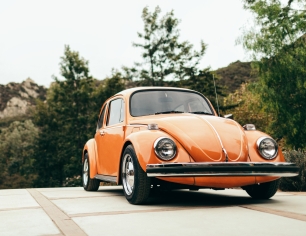When is a car considered a classic?
In general, a car may be considered a classic if it has historical or cultural significance, is desirable due to its rarity and condition, and is recognized by authoritative organizations as worth preserving. The definition of a classic car varies, and the term "classic car" is often used as an umbrella term for older vehicles that are considered collectible, including those that may also fall into vintage or antique categories. Sources vary on how they define classic cars with ranges typically falling anywhere from 10 to 50 years old, though some narrow it down 20 to 40 years.
Explore Progressive Answers' auto editorial guidelines to find out why you can trust the car insurance information you find here.
What features define a car as a classic?
According to the Volo Auto Museum, these features are most important in determining whether a car is a classic car:
Age
There's no agreed-upon age that categorizes a car as classic. Generally, cars that are 25 years or older are considered classic by most enthusiasts and organizations.
Historical or cultural significance
Most classic cars have made an impact on automotive history or popular culture. Some classic cars, such as the 1967 Thunderbird, are revered for their innovative design. Other classics like the Chevrolet Camaro, have become cultural icons through appearances in TV and film. These vehicles have come to represent specific eras and lifestyles.
Rarity
A car's desirability plays a major role in its status as a classic. Collectors and enthusiasts often covet older models that were limited in production or discontinued. These vehicles become more desirable if they're special editions or include rare trim packages. The more difficult a model is to find in good condition, the more likely it is to be considered a classic.
Condition
Condition is often what separates a good classic car from a great classic car. The closer a car is to its original state, the more highly regarded it is as a classic. Many owners are extremely meticulous in their care and desire for authenticity, which boosts the value of the car and displays a respect for the car's history. Learn more about classic car conditions.
Recognition
The classic car community is made up of passionate enthusiasts and respected organizations, such as the Antique Automobile Club of America (AACA) and the Classic Car Club of America (CCCA). These groups often have strict criteria for what qualifies as a classic car. When a vehicle is recognized or certified by one of these organizations, it gains credibility and often sees a boost in both reputation and value.
Value
Vehicle value — and how it changes over time — can be an indicator of a classic vehicle. According to our friends at Hagerty, classic vehicles maintain or appreciate in value over time. Compare that against most daily driver cars that depreciate year over year. Check out Hagerty Valuation Tools, which include car price guide values and real-world vehicle sales results on more than 40,000 different cars, trucks, SUVs, and motorcycles.
What's the difference between a classic, vintage, or antique car?
- Classic: A classic car is generally defined as any vehicle 25 years or older, depending on the organization. These cars are usually recognized for their historical or cultural significance, rarity, and/or original condition.
- Vintage: Most organizations and enthusiasts agree, according to Hagerty, that a car qualifies as vintage if it was built between 1919 and 1939 and remains mostly unmodified. The age and historic nature of these cars make them prized commodities among collectors.
- Antique: According to Hagerty, antique vehicles include both the Brass Era and the vintage years, generally referring to any car built before 1919. The Brass Era was named for the use of polished brass in lights, radiators, and trim. These cars are typically showcased in museums or car events.
The precise definitions of each type of car varies depending on the source, whether it's a collector organization, insurer, or even the state DMV. So if you're registering the car, buying a car, or entering the car into competition, it's important to double check the criteria.
Does having a classic car change your insurance?
Yes, a classic car insurance policy differs from a standard auto policy. A classic car policy typically insures your vehicle for its true market value, whereas a standard auto policy may only cover the actual cash value of a car (the cost to replace the car minus depreciation). The difference in how value is determined is especially important for classic car owners.
Agreed value and stated value are two common methods insurers use to determine payout limits for classic cars. Stated value is what you say your car is worth (potentially requiring proof), while agreed value is the insured amount you and your insurer agree on. Neither is the same as the actual cash value of your car, as that factors in depreciation based on age. Learn more about agreed value coverage.
Does Progressive offer classic car insurance?
Yes, Progressive offers specialized coverage through the Progressive Classic Car by Hagerty® program. It’s important to note that this program offers coverage for all vehicle types listed — antique, vintage, and classic — and includes Hagerty's Guaranteed Value® coverage, expert claims handling and parts sourcing, and flexible usage giving owners the freedom to drive their classics. Learn more about classic car insurance with Progressive.

Get a free quote for classic car insurance today
Learn more about classic car insurance policies.









